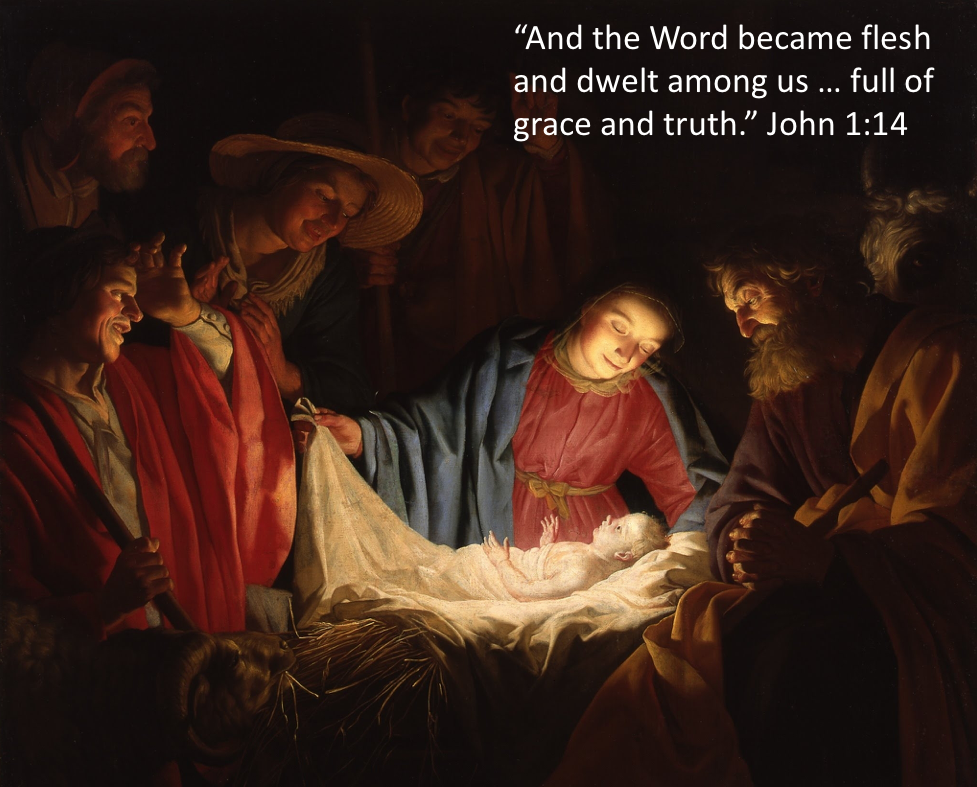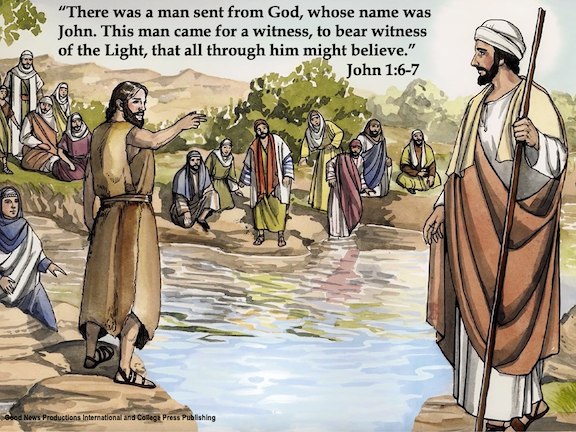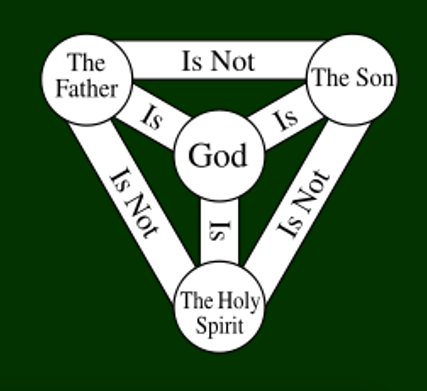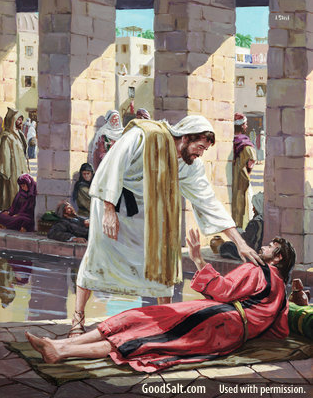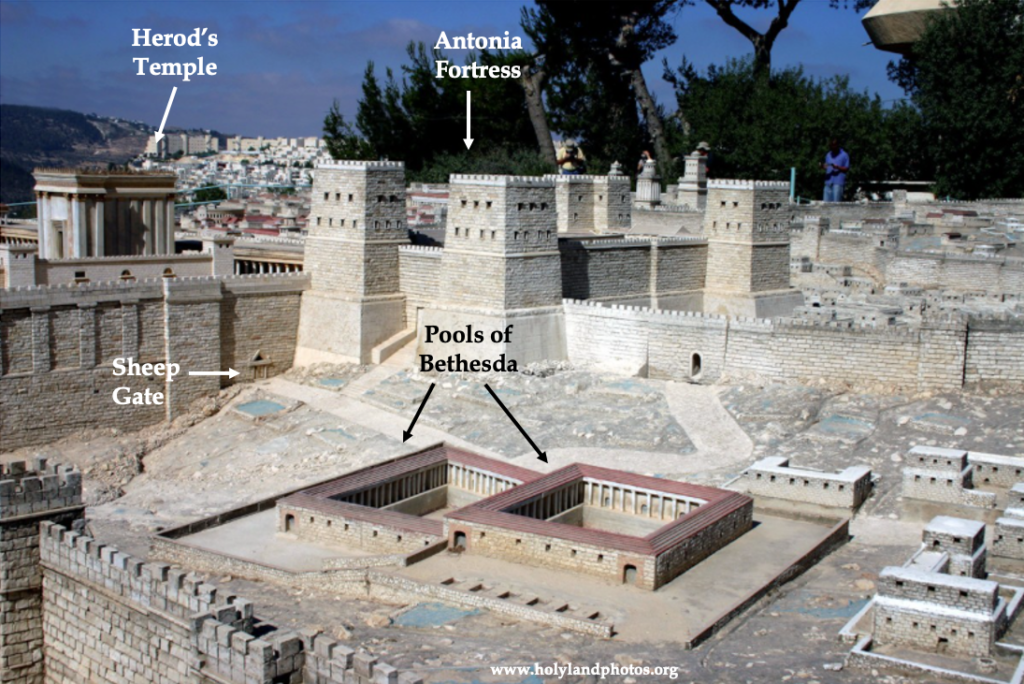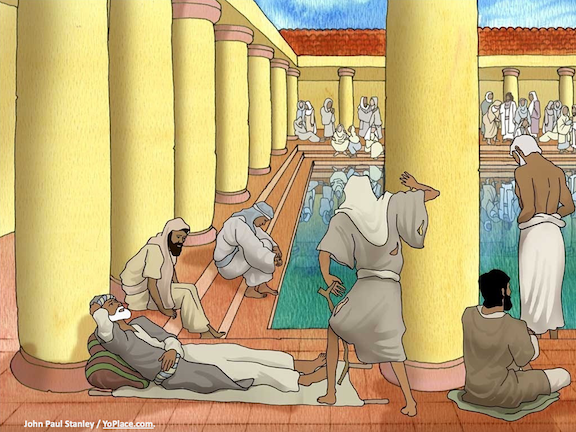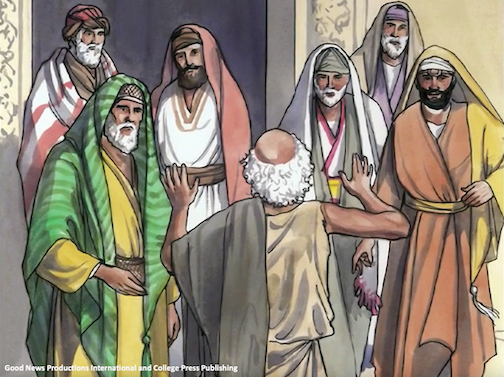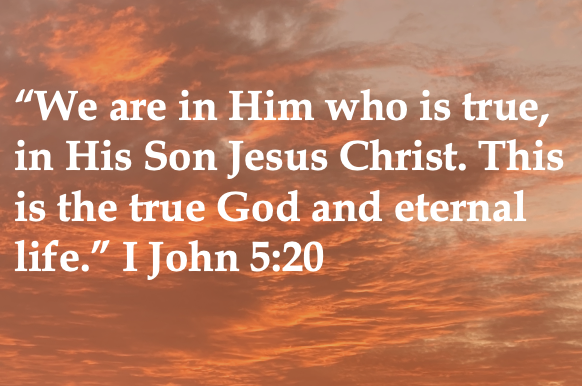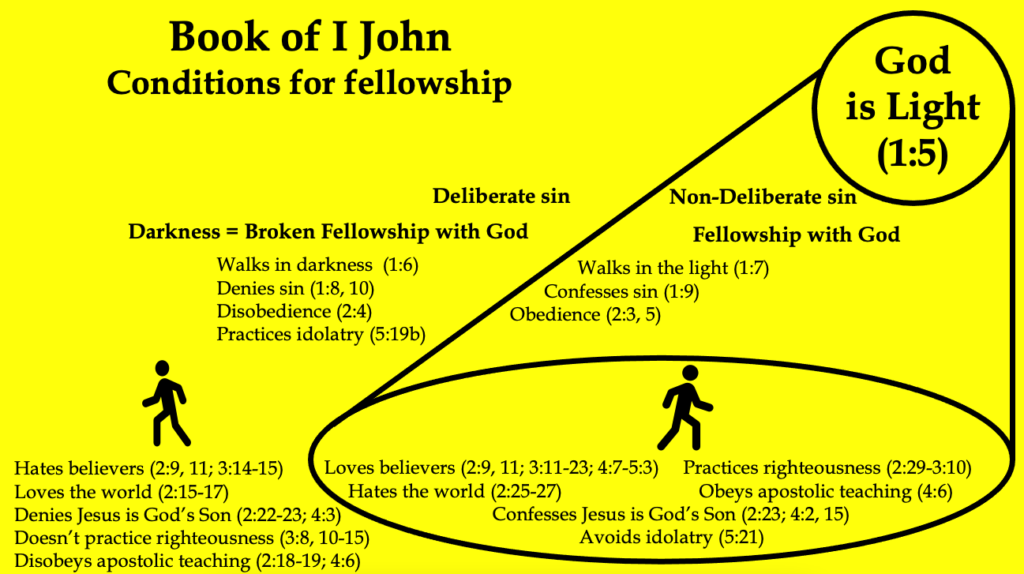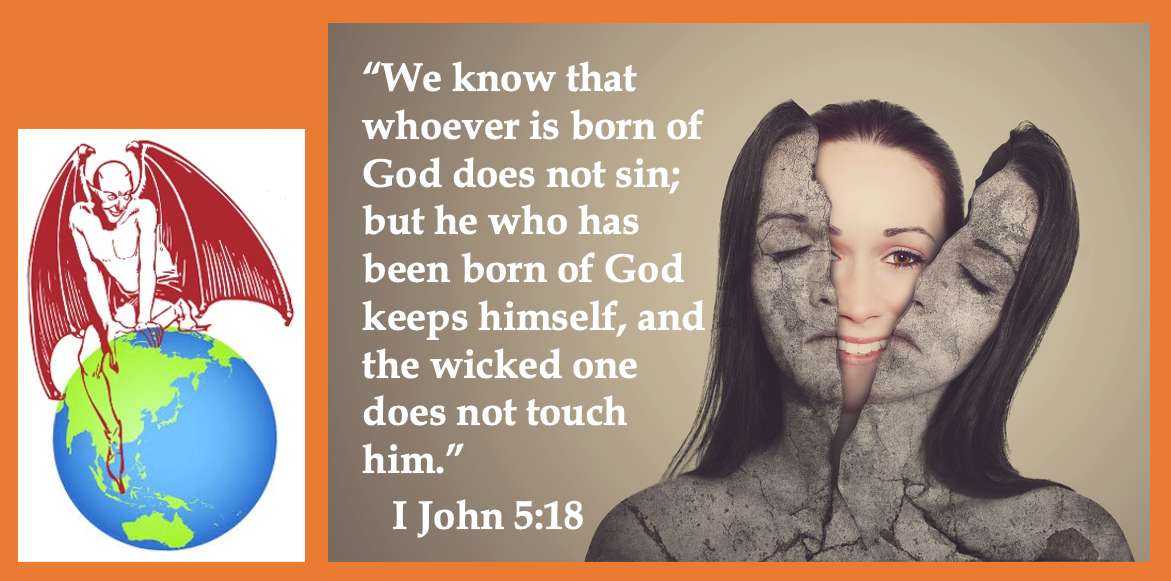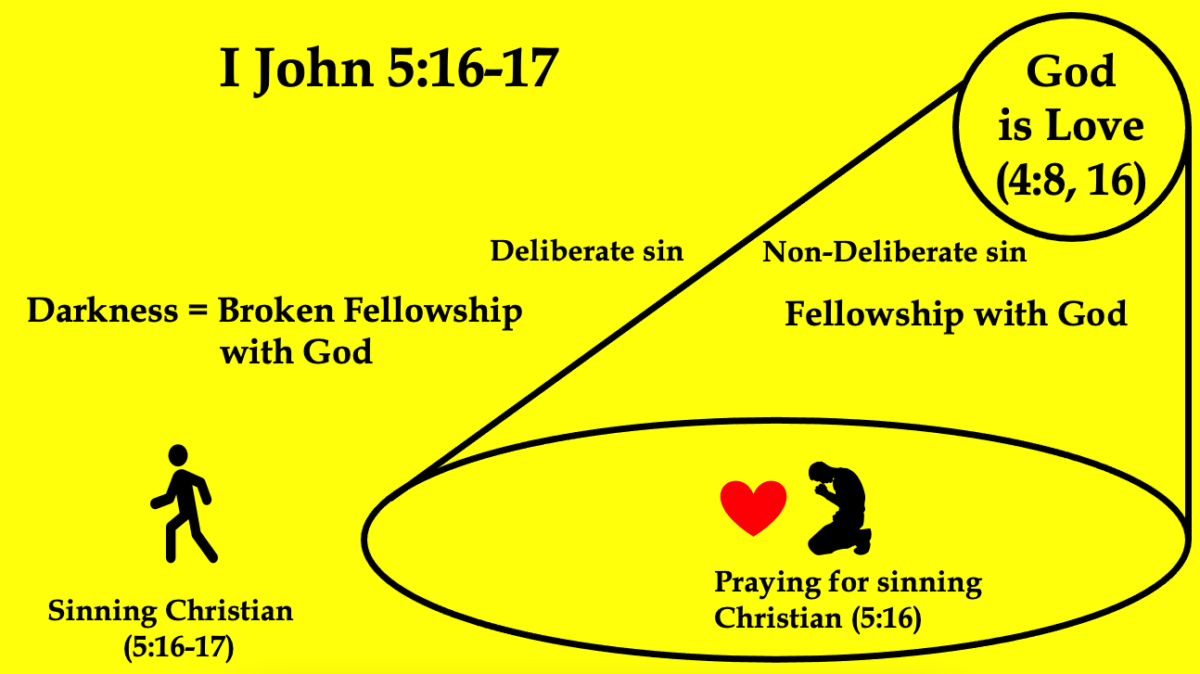“And the Word became flesh and dwelt among us, and we beheld His glory, the glory as of the only begotten of the Father, full of grace and truth.” John 1:14
What is God like? Let’s see what some fifth graders said when their teacher at a Christian school asked her class to look at TV commercials and see if they could use them in some way to communicate ideas about God. God is like BAYER ASPIRIN. He works miracles. God is like a FORD. He’s got a better idea. God is like COKE. He’s the real thing. God is like HALLMARK CARDS. He cares enough to send His very best. God is like TIDE. He gets the stains out that others leave behind. God is like GENERAL ELECTRIC. He brings good things to life. God is like SEARS. He has everything. God is like ALKA-SELTZER. Try Him, you’ll like Him. God is like SCOTCH TAPE. You can’t see Him, but you know He’s there. God is like DELTA. He’s ready when you are. [1]
In John 1:14-18 we are going to see that God became a man to show us what He is like. In the first five verses of John, we saw that the Word, Jesus Christ, is our Creator God. Thus, when we look at Jesus, we are looking at our Creator God in human flesh. He made you and me to have a relationship with Him. So, what is God like?
GOD IS APPROACHABLE. 1:14a: John returns to the use of the “Word” [2] that he introduced in verse 1 when he writes, “And the Word became flesh.” The most amazing fact of history is that the eternal Logos, God Himself (1:1), voluntarily “became flesh” or a human being without ceasing to be God (1:14a). The word for “flesh” [3] here does not refer to humanity’s sinful flesh or desires (cf. Rom. 8:4-5; Gal. 5:16-17, 19-21), but to Jesus’ sinless human nature (cf. Rom. 1:3; 9:5; 2 Cor. 5:21; I Tim. 3:16; Heb. 2:14; 4:15; I Pet. 3:18). [4]
Unlike Adam and all his descendants before and after Christ who were born as sinners (Rom. 5:12; Ps. 51:5), Christ is the only Person to be born with a sinless human nature. The best explanation I have heard for this is that Jesus had a sinless Father in God the Holy Spirit (Matt. 1:20), whereas all other human beings had a sinful father. The sin nature seems to be passed on through the human father. “Therefore, just as through one man sin entered the world, and death through sin, and thus death spread to all men, because all sinned” (cf. Rom. 5:18).Although Eve sinned first in the Garden of Eden (Gen. 3:1-6), Adam is held accountable for sin’s entrance into the world.
The Bible also teaches that God visits “the iniquity of the fathers upon the children to the third and fourth generations” (Exod. 20:5; cf. Deut. 5:9). Generational sins are passed on through the fathers, not the mothers.This implies that the sin nature is transmitted through the fathers, not the mothers or both parents.
Hence, Christ possesses a sinless human nature because He was conceived by God the Holy Spirit in the womb of Mary (Matt. 1:20).
When John says “the Word became flesh (1:14a), he is emphasizing that Christ did not merely “appear” like a man; He became an actual man (cf. Phil. 2:5-9). [5]
In John’s day there were false teachers who taught that God could not become a man because all human flesh is inherently evil, and God is inherently good or perfect. Therefore, Jesus only appeared to be a human being.
Swindoll explains: “In our day, the influence of naturalism has so permeated culture that we have trouble accepting the deity of Christ. In John’s day, most people had no problem accepting Christ’s deity. They were more troubled by His humanity. The influence of Plato permeated every aspect of religion and philosophy so that anything tangible came to be seen as inherently evil. The great hope of Greek philosophers was to escape the foul, obnoxious material realm in order to commune with the divine mind, which existed only in the realm of pure ideas. In life, they tried to deny the body as a means of connecting with what they conceived of as god. They saw death as the liberation of the soul (the good aspect of man) from the prison of the body (the evil aspect of man). So, naturally, they recoiled from the notion that God would become anything genuinely physical.
“To preserve the sinlessness of God, philosophers invented all kinds of myths to explain how Christ could appear human without actually having earthly material be a part of His nature. The most common, Docetism, suggested that He only seemed to be tangible, but was in fact a heavenly apparition. The so-called ‘Gnostic Gospels’ tell stories of how Jesus created the illusion of eating food while never actually digesting it or needing to relieve Himself.” [6]
When John states “the Word became flesh,” his choice of words were very offensive to the false teachers of his day. “Flesh” meant something inherently evil to them. In essence, John is saying that “The Word became meat.” [7]
When John says the eternal Word “dwelt among us” the word translated “dwelt” [8] means “to tabernacle, take up residence.” [9] Just as God’s presence dwelt among the Israelites in the tabernacle (cf. Exod. 25:8-9; 33:7, 11), so He lived among people in the Person of Jesus Christ. King Solomon thought it incredible that God would dwell on the earth (1 Kings 8:27), but that is precisely what He did in Jesus.
While the docetistic false teachers in John’s day were resistant to the truth of Christ’s tangible human nature, John skillfully refuted their heresies with great skill under the guidance of the Holy Spirit. In his epistle he spoke of the Word of Life, Jesus Christ, as being “heard… seen with our eyes… looked upon, and our hands have handled.” (I John 1:1). Christ did not merely “appear “to be human. He became a tangible human being Who was “heard… seen…” and touched. To deny that Christ became tangible human flesh was “antichrist” and to be refuted (cf. I John 4:2-3).
“Conceived by the Holy Spirit in the womb of Mary (see Matt. 1:20), the divine Son of God became a man. He is thus the God-Man—not half man and half God, but one Person with a fully divine nature and a fully human nature. He is deity poured into humanity. He is fully human, so He cried as an infant, but He is fully divine and gave life to His mother! He is fully human so He had to sleep, but He is fully divine and can raise the dead back to life. Our God fully experienced what it is to be human—yet without sinning (see Heb. 4:15). He faced hunger, pain, temptation, grief, hardship, and rejection. You face no category of human experience that your Savior has not endured.” [10]
Religions seek to know how we as humans can get to God. Yet the Bible tells us that God came to us. The Word became flesh. Why did God become a man? So, we could approach Him and trust Him.
A construction company was once building a road through some mountainous country, using dynamite to build a roadbed. Steve, who worked for the company, was placing the dynamite charges. One day as he was getting ready to detonate a charge, he noticed that several little chipmunks had come out of the underbrush, playing around the hole where he had installed the explosives. Steve, being a tenderhearted guy, didn’t want to see those little chipmunks blown to bits, so he began trying to shew the chipmunks away. Each time however, they just came right back to the location. His supervisor, Charlie, came out to see what was holding up the blasting. Steve, exasperated, explained that those chipmunks would not get out of the danger area. Charlie chuckled, and then used the incident to talk about Jesus Christ.
He explained to Steve that the only way one of them could communicate with those chipmunks, was if one of them became a chipmunk, and yet at the same time, kept all the characteristics of a man. [11] Chipmunks are afraid of humans because we are twenty times their size. But if you become a chipmunk, they would be able to trust you and relate to you, because you would be able to communicate the great danger caused by the dynamite. This is exactly what God had to do too – He became a man to communicate with the human race what God is really like and to warn them of the incredible danger facing them if they rejected Christ. If God came to us in the fullness of His glory, we would be too frightened of Him to trust Him like a chipmunk would be too scared to trust us.
Jesus became a human being so that you and I could relate to Him and He to us. Therefore, we are to trust Him at all times because He understands us. “Since we do not have a High Priest who cannot sympathize with our weaknesses, but was in all points tempted as we are yet without sin; Therefore, let us boldly come to the throne of grace.” (Heb. 4:15-16). He voluntarily became one of us so that you and I would believe that our Savior knows how we feel.
Perhaps you have viewed God as some distant impersonal force who does not care about you or your circumstances. You may say to yourself, “How could God let COVID-19 happen? I have lost my income, my health, and my friends! What kind of God is this?” Please understand that the God of the Bible is not some distant dictator who delights in punishing people.
Christian author Max Lucado writes, “From the funeral to the factory to the frustration of a demanding schedule, Jesus Christ understands. When you tell God that you’ve reached your limit, He knows what you mean. When you shake your head at impossible deadlines, He shakes His, too. When your plans are interrupted by people who have other plans, He nods in empathy. He has been there. He knows how you feel… Rejection? He felt it. Temptation? He knew it. Loneliness? He experienced it. Death? He tasted it. And stress? He could write a best-selling book about it. Why did He do it? One reason. So that when you hurt, you will go to Him… and let Him heal you.” [12]
GOD IS FULL OF GRACE AND TRUTH. 1:14b: Now we are getting to the heart of this passage. John and the other disciples “beheld” Jesus’ “glory.” They were eyewitnesses to this.
“They saw His glory at the Mount of Transfiguration, in the signs Jesus did, and in His sinless life.” [13]
Christ’s glory was filled with “grace and truth.” Jesus maintained a perfect balance between these two attributes. Of all the phrases that God could have used to describe Jesus Christ, He chose “grace and truth.” “Grace “ [14] refers to “graciousness, favor, help, or goodwill.” [15] Theologians describe “grace” as God’s unmerited favor or getting what we do not deserve. We do not deserve eternal life, forgiveness, or salvation from hell, but Jesus Christ can freely offer this to us apart from any of our works because of His “grace” (John 4:10-14; Rom. 3:24; 4:4-5; 6:23b; 11:6; Ephes. 2:8-9). In the context, “grace” refers to the graciousness of Christ. [16]
The word for “truth” [17] means “truthfulness, dependability, uprightness in thought and deed, reality.” [18] “Truth” is the perfect standard of God’s holiness.Truth says there is a right way, a best way. Grace gives us the encouragement to get there.
In life, some things are true which makes other things false. We do reap what we sow. There are consequences to our actions. Truth is true. It is unbendable and unbreakable and unyielding. Jesus came full of truth. Every word that He spoke was truth. Christ never told a lie. Every action and every thought were true. When Satan came against Jesus tempting Him by perverting the Word of God just a little (Matt. 4:1-11), how did Jesus respond? “It is written in God’s Word. Here’s the truth.” He always countered falsehood with truth.
Near the end of His life before Pilate, Jesus said, “Everyone who is of the truth hears My voice” (John 18:37). Pilate said to Him, “What is truth” (John 18:37-38)? Then Pilate walked away. That was a big mistake, because the One Who is “the way, the truth, and the life” (John 14:6) was right in front of him. The One Who is and knows all truth is there. So, truth must be included in grace or grace is merely tolerance.
Truth without grace is just as destructive as grace without truth. Truth without grace is unbearable. Only the arrogant, proud hypocrite thinks all he needs is truth, because he thinks he has it all together. In the Sermon on the Mount in Matthew 5-7, Jesus outlines the perfect life. In the middle of that sermon Jesus says, “Therefore you shall be perfect, just as your Father in heaven is perfect” (Matt. 5:48). Jesus means what He says here. When I read the expectations of God on my life and I hear His call to be perfect, I say, “Lord I can’t do it. Have mercy on me a sinner, because I fall way too short. The bar is too high.” That’s the demand of truth all by itself and it overwhelms us. God says, “I didn’t just come in truth, I came in grace.”
Why are grace and truth so important? As humans, we tend to err on one side or the other of grace and truth. Grace without truth is wishy washy. It is a farce. It is called tolerance. There are no absolutes… no right or wrong… no consequences for our actions. Anything goes, resulting in lives without direction. There is nothing we can know for sure which is tolerance. For grace to be real, it must be based on truth.
For example, grace without truth is like taking your car to the body shop to get rid of the rust. You get the car back and it looks great. But a year later the rust appears again. The mechanic didn’t remove the rust, he just covered it up to make it look good. Eventually, the rust keeps coming back. That’s how it is when you try to ignore truth. You can ignore truth for a while, but it keeps coming back. I can ignore the law of gravity and step off a cliff – and the law of gravity still applies to me. It doesn’t matter what you believe in that case. If you ignore it, it bites you.
Without grace the shepherd says, “That stupid sheep is the one who wandered away. He is on his own now.” But grace causes him to leave the ninety-nine to find that sheep and bring him home so there is rejoicing (Luke 15:1-7).
Without grace the prodigal son stays in the pig pen and never comes home because he knows there is no forgiveness. He’s gone too far without grace. But grace sets him on the road home (Luke 15:11-32).
Without grace the truth demands that Peter who denied Jesus three times be done being an apostle. But Jesus comes to him in grace and says, “Feed My sheep. I’m not done with you yet Peter” (John 21:15-19).
Without grace the wedding feast is over because the family should have planned better, so they did not run out of wine. But Jesus stepped in with grace and transformed the water into wine (John 2:1-11).
Without grace the Samaritan woman, who had been married five times and divorced and was now living with a man who was not her husband, wouldn’t have even received a look much less a word from Jesus (John 4:1-26). But He spoke to her because of His grace, and her life was transformed.
Without grace, Matthew, the tax collector who was ripping everyone off, never gets called to follow Jesus. But Jesus comes to Him and says, “Follow Me” (Matt. 9:9-13).
Without grace, the thief on the cross dies in his sin and goes to hell. But with grace, Jesus says, “Today you will be with Me in Paradise” (Luke 23:39-43).
Praise God that Jesus came not just full of truth, but full of grace. The truth is as a Christian, you are not supposed to worry. But I thank God for His grace because I am so prone to worry.
The truth is God hates divorce (Mal. 2:16), but God comes to us in our brokenness and heals us.
The truth is sexual impurity degrades our bodies (I Cor. 6:12-20), but grace comes in and washes us clean.
The truth is that God calls homosexual and lesbian activity an abomination (Lev. 18:22; 20:13; Rom. 1:26-27), but God comes in with His grace and changes people.
The truth is God detests gossip and slander (Prov. 6:14, 19; 10:18;). But God comes in with His grace and washes us clean.
The truth is our addictions and yielding to temptations reveal that we don’t have the faith that we should, but God with His grace gives us that strength.
The truth is our attachment to material things is idolatry. But God comes in with His grace and rescues us from the power of things.
The truth is we should never get depressed as Christians – we should choose the joy of the Lord. But many of us struggle with this. But God comes in with His grace and lifts us up. You can take truths and swing them like a sword and do damage. But with grace we see God bring healing.
Do you remember the woman in John 8? The religious leaders were ready to stone her because the law (the truth) said you should (cf. Lev. 20:10). She was caught in the act of adultery, and they came to Jesus saying, “The law says she should die. What do you say, Jesus?” For a few moments, Jesus wrote on the ground, while they pestered Him. Then Jesus stood up and looked them in the eye and said, “He who is without sin among you, let him throw a stone at her first” (John 8:7).One by one, starting with the oldest, they all walked away. Jesus kept writing on the ground.
After a while there was no one left except Jesus and the woman. Jesus looked up at her and said, “Woman, where are those accusers of yours? Has no one condemned you?” (John 8:10). She said, “No one, Lord” (John 8:11a). Here’s the thing. On that day, there was somebody there Who could condemn her… Who could have thrown the first stone… there was someone Who was sinless – Jesus (cf. John 18:38b; 2 Cor. 5:21; Heb. 4:15; I Peter 3:18). He could have done it. Instead, Christ said to her, “Neither do I condemn you. Go and sin no more” (John 8:11b). That is grace and truth.
Grace and truth. Don’t keep living like that. That is a path of destruction. Here is the grace. Here is a new start for you. And here is the truth – there is a better way. I love what Max Lucado says: “God loves you just the way you are [that’s grace], but He refuses to leave you there [that’s truth].“ [19]
Truth expresses God’s righteous character and demands punishment for all our sins (Rom. 3:9-23). Jesus Christ was a perfect display of God’s truth. He is “the truth” (John 14:6). He was perfect and sinless (cf. 2 Cor. 5:21; Heb. 4:15; I Pet. 3:18). Even the political leaders could “find no fault in Him at all” (John 18:38; cf. Luke 23:4, 14-15, 22; John 19:4, 6). God’s judgment of sin fell on Jesus instead of us when He died on the cross in our place (Is. 53:5-6; Matt. 27:45-56; Rom. 5:8; I Cor. 15:3; 2 Cor. 5:21; I Peter 3:18). That is truth.
But grace is seen while Jesus was hanging on the cross. After His enemies physically and verbally abused Him, and nailed Him to a cross, Jesus prayed, “Father, forgive them, for they do not know what they do” (Luke 23:34). Did they deserve Christ’s forgiveness. No, none of us do. But grace offers forgiveness freely. Jesus also said to the thief hanging next to Him, “Today you will be with Me in Paradise” (Luke 23:43). Without grace, the thief on that cross dies in his sin and goes to hell.
Christ is full of grace and truth. He has the perfect ability to tell us the awful truth about ourselves, while holding us up by His grace. Because He is full of truth, He was the perfect sacrifice to pay the penalty for our sin (2 Cor. 5:21; I Pet. 3:18). Because He is full of grace, you can come to Him just as you are, without having to clean up your life first. And because He is full of truth, you can come in complete confidence knowing that He will keep His promise to forgive you and grant you eternal life the moment you believe in Him. Jesus promised, “He who believes in Me has everlasting life” (John 6:47).
That is grace and that’s truth. Jesus was full of both. Therefore, we are to seek to be gracious and truthful with one another (Ephes. 4:15). We are called to forgive others as Christ has forgiven us (Ephes. 4:32; Col. 3:13). Is there someone in your life that needs not just truth, but grace? Something has come between you and your relationship? They need to hear from you that the past is gone. It has been wiped out. That is the power of grace.
We also see that GOD IS ETERNAL. In addition to the apostle John’s and other disciples’ witness of Jesus,John now records the testimony of John the Baptist (1:15-18). [20]1:15: We are told that John the Baptist “bore witness” of Jesus. The Greek word translated “bore witness” martureō [21] is used in a courtroom setting (see comments on 1:7). And it means “to testify, give evidence, or speak the truth.” [22]
When John the Baptist testifies about Jesus, he is not speaking softly. The Bible says he “cried out.” The Greek word translated “cried out” [23] is imitative of a raven’s piercing cry or shriek. [24] It expresses an urgent scream or shout from someone who has deep emotions about their message. John was extremely passionate regarding what he was about to say. Why? Because he understood Who Jesus is and he also understood his purpose. John the Baptist was “sent from God… to bear witness of the Light,” Jesus Christ (John 1:6-7; 8:12). He understood his identity as “the voice of one crying in the wilderness: ‘Make straight the way of the Lord’” (John 1:23; cf. Is. 40:3). John’s purpose was to prepare the people of Israel “that all through him might believe” in their coming Messiah-God for His gift of everlasting life (John 1:7b; 3:36; cf. Acts 19:4). John’s voice was temporary, but his message was eternal.
The Baptist’s message centered around an eternal Person. He cried out, “This was He of whom I said, ‘He who comes after me is preferred before me, for He was before me’” (1:15b). The word translated “preferred” [25] denotes having greater dignity or rank than another (cf. Gen. 48:20; John 1:30). [26]
In Bible times, chronological priority meant superiority (those who were born first were considered superior). John is saying that Jesus is superior to him because Christ came before him. John the Baptist recognized the preexistence of the Word, Jesus Christ, as God (John 1:1-2). Even though John the Baptist was born six months prior to Jesus (Luke 1:26, 36), John says “He was before me.”How could John the Baptist say this? He could say this because Jesus was always before John in His preexistent state as God.
In the Old Testament, the Lord God of the universe said, “This is what the Lord says— Israel’s King and Redeemer, the Lord Almighty: ‘I am the first and I am the last; apart from Me there is no God’” (Is. 44:6; cf. 41:4; 48:12). The God of the universe has no beginning and no end because He is eternal. This is what makes Him uniquely God.
In the last book of the Bible, the exalted Lord Jesus Christ said, “I am the Alpha and the Omega,” says the Lord God, “Who is, and Who was, and Who is to come, the Almighty” (Rev. 1:8). The apostle John shares Jesus’ testimony, “When I saw Him, I fell at His feet as though dead. Then He placed His right hand on me and said: ‘Do not be afraid. I am the First and the Last’” (Rev. 1:17; cf. 1:13). At the end of the Book of Revelation the exalted Lord Jesus Christ said, “I am the Alpha and the Omega, the First and the Last, the Beginning and the End” (Rev. 22:13). Make no mistake, the Lord God of the Old Testament is the same as the Lord Jesus Christ in the New Testament. This is John the Baptist’s message. He is acknowledging Jesus’ superiority as the eternal God with no beginning and no end when He says, “He was before me” (1:15b).
When the Coronavirus was in the news a lot, all of us are confronted with the frailty of humanity. None of us are promised life on earth tomorrow. God used COVID-19 to persuade people to think about what is eternal.
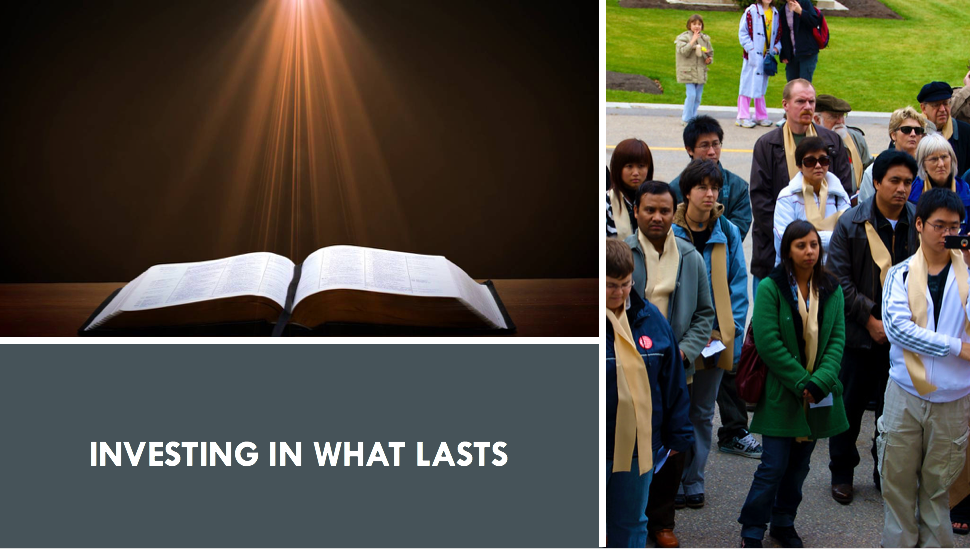
Since Jesus has no beginning and no end, we are to invest our lives in what lasts. What two things on this planet last for eternity? It is not your bank account… cell phone… video games… house… car… job… or your achievements. I have done a lot of funerals, and I have never seen anyone pull a U-Haul behind a hearse. What lasts forever on earth is people (Matt. 25:46) and the Word of God (I Pet. 1:23-24). We have an incredible opportunity to invest in both by preaching the gospel of Jesus Christ to the unsaved (Mark 16:15) and then training those who believe in Christ through the discipleship process (Matt. 28:19-20).
With whom are you sharing the gospel and training in discipleship? If we are not evangelizing and then discipling those who believe the gospel, we are failing to invest our lives in what is lasting. But this need not continue. Today, you can decide to invest your life in what lasts forever. Ask God to show you whom He wants you to disciple or be discipled by. He enjoys answering that prayer.

1:16: If John the Baptist is still speaking here, then the “we”refers to all Israelites. The phrase “grace for grace” [27] means “grace after grace.”[28]Like the waves along a beach, one wave of grace after another has been repeatedly manifested in Israel’s history. Everything the nation of Israel had received was based on the grace of Jesus Christ. Israel’s existence today (and ours) is a testimony of God’s grace.
An example of God’s grace in Israel’s history is seen the next verse. 1:17a: When the law was given through Moses, Israel stood in great need of God’s grace. While Moses was on Mount Sinai receiving the Law from God, Israel was down below sinning against the Lord by making a golden calf to worship (Exod. 32:1-6). For such a sin, the Law required only condemnation and judgment. Hence, God’s anger burned against His people (Exod. 32:7-10). But Moses prayed to God and God spared the nation by His grace (Exod. 32:14). A purifying judgment ensued (Exod. 32:15-29).
Moses then sought reassurance that God would forgive and accept the nation as His own. So “the Lord passed before him and proclaimed, ‘The lord, the Lord God, merciful and gracious, longsuffering, and abounding in goodness and truth, keeping mercy for thousands, forgiving iniquity and transgression and sin, by no means clearing the guilty, visiting the iniquity of the fathers upon the children and the children’s children to the third and the fourth generation’” (Exod. 34:6-7). We see a definite clash between God’s grace and truth here. How can God forgive “iniquity and transgression and sin” and yet “by no means clearing the guilty?” The solution is finally found in Jesus Christ.
1:17b: Through Christ and His sacrifice as the Lamb of God, the dilemma is resolved. Truth expresses God’s righteous character and demands punishment for our sins. Christ was a perfect display of God’s truth. He was perfect and sinless. God’s judgment fell on Jesus instead of us. Grace is seen because of Christ’s death. We can cross over to God by faith in Jesus. God is now free to be gracious to all who receive that grace by faith in Christ.
Out of the “fullness” of His grace, Jesus blesses us with one wave of grace after another (John 1:16). One wave of grace is constantly replaced by a new one each day. “Blessed be the Lord, Who daily loads us with benefits.” (Psalm 68:19). Although we may be feeling bombarded with a multitude of challenges these days, God still has an endless variety of ways to bless us.
He may bless us with a friendly smile from a worker at a drive through window or from someone standing in line at a bus stop. And the truth of the matter is if we would smile more, we will encounter more people who are smiling back at us. Jesus’ grace also enriches our lives with natural beauty all around us. It may be in the form of a ray of sunshine on a cloudy day or blossoms on a flowering tree. In the morning it may be a bird’s beautiful song or in the evening it may be the splendor of the moon and the stars. All of God’s creation is there for us to enjoy.
When I look back on my life, the one word that stands out to me is “grace.” By God’s grace He has brought me through disappointment and pain, some of which was caused by others and much of which I brought on myself. At the age of nineteen, by His grace the Lord Jesus saved me from the penalty of all my sins and gave me everlasting life the moment I believed in Him. By His grace I was enabled to serve Him for over three decades. And by His grace He will lead me forward one day at a time.
1:18: John begins by saying, “No one has seen God at any time” (1:18a). You may wonder, “How can this be true when the Bible speaks of people seeing God?” (e.g., Exod. 33:21-23; Isa. 6:1-5; Rev. 1:10-18). Those encounters with God did not reveal the fullness of His glory or His unveiled divine essence. If people saw God’s unveiled glory or divine essence, they would not live (cf. Exod. 33:20).
The only One Who can and has seen God in the fullness of His glory and divine essence without dying, is His Son, Jesus Christ (John 6:46). The reason Jesus could do this is because He also is God. He has the same divine nature as God the Father. For example, when people say of a man named Clarence Smith, “He is the son of John Smith,” they are acknowledging that he has the same human nature as his father. Likewise, when the Bible says that Jesus is “the Son of God” (John 20:31), it is affirming that Jesus has the same divine nature as His Father in heaven.
Therefore, we can discover what God is like by knowing His “only begotten Son, who is in the bosom of the Father” (1:18b). The phrase “only begotten Son” does not mean Jesus had a beginning like a baby that is birthed by his parents, as many false religions teach today. The compound Greek word translated “only begotten” is monogenḗs, which literally means “one (monos) of a kind (genos).” [29] Jesus Christ is the only One of His kind. He is fully God (John 1:1-3) and fully Man (John 1:14). There has never been anyone like Him before or since. This is the message of the gospel of John.
The writer of this gospel, the apostle John, goes to great lengths to show Jesus’ deity (John 1:1, 34, 49; 5:16-47; 6:69; 8:57-59; 10:30-33; 11:27; 20:28; et. al). Jesus was unlike any other Person who has walked on this earth. In the Old Testament, the phrase “I Am” is how God identified Himself to Moses at the burning bush (Exod. 3:13-14). “I Am” is also how Jesus identified Himself to the people of Israel. He makes several “I AM” statements in the gospel of John: “I am the bread of life” (John 6:35), “I am the door” (John 10:9), “I am the Good Shepherd” (John 10:14), “I am the Resurrection and the Life” (John 11:25), “I am the Way, the Truth and the Life” (John 14:6), “I am the true Vine” (15:1). Each one of these staggering statements attested to the fact that Jesus was and is God.
Jesus also claimed to be equal with God and to be God Himself (John 5:17-18; John 10:10-33). This is why His enemies wanted to kill Jesus for blasphemy (Lev. 20:10; cf. John 5:18; 8:59; 10:31-33; 11:8). For example, when Jesus said, “He and the Father are one” (John 10:30), the Jews understood Him to claim to be God. They said, “For a good work we do not stone You, but for blasphemy, and because You, being a Man, make Yourself God” (John 10:33).
Did Muhammed, the founder of Islam, Buddha, the founder of Buddhism, Joseph Smith, the founder of Mormonism, or Charles Taze Russell, the founder of Jehovah Witnesses, claim to be equal with God? Jesus Christ not only claimed to be God, He proved He was God through His works (John 1-12), the greatest of which was His resurrection from the dead (John 20:1-18; cf. Romans 1:3-4)! Hallelujah, brothers and sisters in Christ! What a precious Lord and Savior we have in Jesus!
John also goes to great lengths to show Jesus’ humanity (John 1:14; 4:6; 11:35; 12:27; 19:28; et. al). Jesus had brothers and sisters like you and me (John 2:12; 7:3, 5; cf: Mark 6:3). Christ ate food and got thirsty just like you and me (John 19:28; 21:12, 15; cf. Matt. 9:11; 11:19; Mark 2:16; Luke 7:34). He experienced physical fatigue and even slept (John 4:6; cf. Matt. 8:24; Mark 4:38; Luke 8:23). Why? He became a man without ceasing to be God so He could understand what it is like for you and me to have family, food, and fatigue. The God of the Bible is not some distant uncaring deity like the religions of the world. He understands our needs and He came to earth to meet our most fundamental needs to be seen, safe, soothed, and secure.

When John says that Jesus was “in the bosom of the Father” (1:18b), he is referring to Christ’s very close and intimate relationship with God the Father. The word “bosom” [30] refers to the upper part of the chest where a garment naturally folded to form a pocket. [31] The picture here is that of a son resting his head on the chest of his father, experiencing a very close and intimate relationship with him. Jesus had the closest and most intimate relationship with God the Father. He knows the heart of God the Father better than anyone because His head often rested upon His Father’s chest in eternity past.
Who better to tell others what a Person is like than the One who is closest to that Person and has known Him the longest in an intimate relationship!?! There is no one more qualified to tell us what God is like than the only begotten Son of God who has known God the Father forever in the closest of relationships with Him.
This is why John then says, “He has declared Him” (1:18c). The word “declared” [32] is where we get our English words, “exegete” and “exegesis” from. It means to “set forth in great detail, to expound” [33] or “to lead out, to draw out in narrative, to recount.” [34] In seminary, we learned to “exegete” or explain God’s Word, the Bible. We were taught to “read out” of the Bible God’s intended meaning through a grammatical, historical, and literal interpretation instead of “reading into” the Bible our own biases and assumptions.
God the Son, Jesus Christ, has “exegeted” or “set forth in great deal” what God the Father is like. Jesus is more qualified than anyone else to explain what God the Father is like because He, being God, knows God the Father longer and more intimately than anyone else.
For some of you reading this, it may be very difficult for you to perceive God as your Father because you have been deeply wounded by your own earthly father through his absence or even his abuse towards you. You may detest the thought of God being a Father because your own earthly father caused you a lot of pain. Hence, you want nothing to do with fathers.
Please understand that God the Father is nothing like your absent or abusive father on earth. God wants you to know Him for Who He truly is. And there is no one more qualified to reveal God the Father to you than Jesus Christ.
Therefore, Jesus said, “He who sees Me sees Him [the Father] who sent Me” (John 12:45). He also said, “If you had known Me, you would have known My Father also; and from now on you know Him and have seen Him” (John 14:7). Christ said, “He who has seen Me has seen the Father” (John 14:9b) because Jesus is the perfect reflection of the Father.
If you want to know God the Father, get to know His only begotten Son, Jesus Christ, because He is God in human flesh (John 1:1, 14; Tit. 2:13; I Tim. 3:16; Heb. 1:8; I John 5:20). You can begin a relationship with God the Son and God the Father through faith. Jesus said, “Most assuredly, I say to you, he who hears My word and believes in Him who sent Me has everlasting life, and shall not come into judgment, but has passed from death into life” (John 5:24).
To believe in the Father Who sent Jesus is the same as believing in Jesus because Christ is the perfect reflection of the Father, being God Himself. Therefore, Jesus could say, “He who believes in Me, believes not in Me but in Him who sent Me” (John 12:44).
Jesus said, “he who hears My word and believes…” (John 5:24a). Have you heard Jesus’ promise of everlasting life and believed it? If so, Jesus guarantees the person who has heard and believed that he now “has [present tense] everlasting life” (John 5:24b). You do not have to wait until you die to experience everlasting life. If you have heard Jesus’ promise of everlasting life (John 3:16) and believed it, you can now experience His forever life every day of your life on earth and beyond!!!
Christ also guarantees to the one who has heard and believed His promise of eternal life that he “shall not [future tense] come into judgment” for his sins in the future (John 5:24c). Why?
Because Jesus was judged on the cross for all our sins when He died, and God the Father was satisfied with Jesus’ full payment for our sins (John 19:30; I John 2:2). Therefore, we will never be eternally punished for our sins if we have heard and believed Jesus’ promise of everlasting life.
Lastly, Jesus promises that the one who has heard and believed His promise of everlasting life “has passed [past tense] from death into life” (John 5:24d). This means that eternal death is behind you, not ahead of you. It is past, not present or future. You are now in the sphere of “life” or relationship with God. When God looks at our life after we believe in Christ, what does He see? He sees only the blood of His Son and His goodness in our lives (Ephes. 1:7; Rev. 1:5; 12:11). In the sphere of “life,” God has no charge against the believer (Rom. 8:33). The believer is “justified” (“declared totally righteous”) of all things based on his or her faith in Christ (Rom. 4:5). All our sin has been covered by the goodness of Jesus Christ (2 Cor. 5:21). We are seen by God as completely holy and perfect because of His grace (Ephes. 1:4). That is why God can let us into His heaven when we die if we have believed in Christ as our Savior.
We can know what God is like by looking at Jesus. He came to make the Father known. Christ is full of grace and truth. He has the perfect ability to tell us the awful truth about ourselves, while holding us up by His grace. Because He is full of truth, He was the perfect sacrifice to pay the penalty for our sin. Because He is full of grace, you can come to Him just as you are, without having to clean up your life first. And because He is full of truth, you can come in complete confidence knowing that He will keep His promise to forgive you and grant you eternal life the moment you believe in Him. Jesus promised, “He who believes in Me has everlasting life” (John 6:47). Do you believe this?
If someone asks you, “What is God like?” Encourage them to get to know Jesus Christ because to know Him is to know God since Jesus is fully God.
Prayer: Precious Lord Jesus, thank You for coming to earth to explain what God the Father is like so we may have a close and intimate relationship with Him and You. Please help us to see the Father as full of grace and truth like You, Lord. Renew our minds so we may see You both as You truly are – abounding in goodness, grace, love, mercy, and truth. Use us to point the unsaved to You by reflecting Your grace by being gracious to them and Your truth by being truthful with them. May those without eternal life be convinced that Your grace and truth guarantees them everlasting life the moment they believe in You alone, Lord Jesus. Please bring healing to those who have been deeply wounded by their earthly fathers or father figures so they may approach our Father in heaven as a good good Father who infinitely and unconditionally loves them. In Your mighty name we pray, Lord Jesus. Amen.
FOOTNOTES:
[1] http://www.christianforumsite.com/threads/kids-communicate-ideas-about-god.5430/.
[2] Logos
[3] sarx
[4] Bauer, A Greek-English Lexicon of the New Testament, pp. 914-16; cf. Constable, Dr. Constable’s Notes on John, pp. 36-37 cites Lewis S. Chafer, Systematic Theology, 1:382-96, 3:33-34, for discussions of Christ’s hypostatic union (the union of His divine and human natures in the Incarnation).
[5] Blum, The Bible Knowledge Commentary Gospels, Kindle Edition, pg. 546.
[6] Swindoll, Insights on John, pp. 25-26.
[7] Ibid., pg. 26.
[8] skēnoō
[9] Bauer, A Greek-English Lexicon of the New Testament, pg. 929.
[10] Evans, The Tony Evans Bible Commentary, pg. 2198.
[11] Haddon Robinson, Larry Moyer, Michael Cocoris, Nancy Hardin, Eight Vital Relationships for the Growing Christian (Dallas: EvanTell, Inc., 1982), Chapter 2, pg. 6.
[12] Max Lucado, In the Eye of the Storm: A Day in the Life of Jesus, (Nashville: Thomas Nelson, Inc., 1991), pp. 16-18.
[13] Wilkin, The Grace New Testament Commentary, Kindle Edition, pg. 180.
[14] charitos
[15] Bauer, A Greek-English Lexicon of the New Testament, pp. 1079-1080.
[16] Constable, Dr. Constable’s Notes on John, pg. 40.
[17] alētheias
[18] Bauer, A Greek-English Lexicon of the New Testament, pp. 42-43.
[19] https://maxlucado.com/products/just-like-jesus/.
[20] Zane C. Hodges, “Grace after Grace—John 1:16,” Bibliotheca Sacra 135:537 (January- March 1978):34-45.
[21] martureō
[22] Bauer, A Greek-English Lexicon of the New Testament, pp. 617-618.
[23] krazō
[24] Bauer, A Greek-English Lexicon of the New Testament, pp. 563-564.
[25] emprosthen
[26] Bauer, A Greek-English Lexicon of the New Testament, pg. 325.
[27] charin anti charitos
[28] Constable, Dr. Constable’s Notes on John, pg. 42 cites those who hold to this view: F. F. Bruce, The Gospel of John: Introduction, Exposition and Notes (Grand Rapids: Wm. B. Eerdmans Publishing Co., 1983), pg. 42; Morris, The Gospel According to John, pg. 98; Hodges, “Grace after Grace” Bibliotheca Sacra, pp. 34-45; see also Robertson, A. T. Robertson’s Word Pictures in the New Testament, Kindle Location 50210 to 50228.
[29] Bauer, A Greek-English Lexicon of the New Testament, pg. 658.
[30] kolpos
[31] Bauer, A Greek-English Lexicon of the New Testament, pp. 556-557.
[32] exēgēsato
[33] Bauer, A Greek-English Lexicon of the New Testament, pg. 349.
[34] Robertson, A. T. Robertson’s Word Pictures in the New Testament, Kindle Location 50363.

